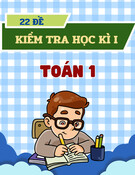
Sở Giáo Dục và Đào Tạo Đồng Tháp
Trường THPT TXCL
Thi Học Sinh Giỏi ĐBSCL Năm Học 2010 – 2011
Môn Anh Văn
ĐÁP ÁN ĐỀ NGHỊ
SECTION 1: VOCABULARY AND GRAMMAR (42 points)
Part 1. (10 points)
Q # 1 2 3 4 5 6 7 8 9 10
Key D B B D B D C D C A
Part 2: (10 points)
1. unable 2. patient 3. intelligent 4. impossible 5. inadequate
6. unsatisfactory 7. incorrect 8. impolite 9. unfortunately
10.inappropriate
Part 3: (13 points)
1. have been 2. want/are planning/plan/ have decided
3. are enjoying/have been enjoying 4. have visited
5. have been wandering/have been walking 6. haven’t spent
7. have taken/ have been taking/ have been getting/ have been doing
8. have had 9. has been
10. say 11. rains
12. have been / have come 13. guess/ suppose
Part 4: ( 9 points):
1.setting them off 2. went in for 3. own up
4. think it over 5. carry on 6. stood up for
7. turned it down 8. put up with 9. found out
SECTION 2: READING (26 points):
Part 1. (15 points)
Q # 1 2 3 4 5 6 7 8 9 10 11 12 13 14 15
Key B C A B B A B D B B A A A D C
Part 2: (11 points)
16. iv 17.vii 18. i 19. ix 20. iii 21. vi
22. celluloid(film) 23. projectors, screens 24. warmth
25. equipment 26. e-theatre

SECTION 3: WRITING (32 points)
Part 1: (15 points)
Q # 1 2 3 4 5 6 7 8 9 10 11 12 13 14 15
Key √ as the the a to so √ √ √ make themselves √ as √
Part 2: (8 points)
1. We haven’t received confirmation about our booking.
2. According to the salesman my new car would be delivered next Wednesday.
3. There have been very few sightings of the Yeti having been seen at this attitude.
4. It is open to doubt whether Jones will get the job.
5. No sooner had the announcement been made than everyone started complaining.
6. The older I get, the less I want to travel.
7. You won’t be able to get a house in that district for under $ 100.000.
8. Alan’s illness was caused by his working hard at the office.
Part 3 (9 points)
1. Without his neighbour’s help, he wouldn’t have managed to repair the garage roof.
2. Everybody can make mistakes.
3. The last Olympic Games took place in Seoul.
4. The sole subject of his conversation was the weather.
5. In the end, I had no regrets about having left the club.
6. You are an idiot to refuse Richard’s offer of a loan.
7. The company has had an intention to replace this model.
8. In the next few years, we are likely to hear a lot more about the environmental
pollution.
9. Paula blamed me for causing/having caused the accident.
THE END

LĐT.HSG 12.CT 1
UBND TỈNH TIỀN GIANG CỘNG HÒA XÃ HỘI CHỦ NGHĨA VIỆT NAM
SỞ GIÁO DỤC& ĐÀO TẠO Độc lập - Tự do - Hạnh phúc
KỲ THI LẬP ĐỘI TUYỂN HOC SINH GIỎI LỚP 12 THPT DỰ THI QUỐC GIA
Môn: ANH VĂN
Thời gian làm bài: 180 phút ( không kể thời gian giao đề )
( Đề gồm 07 trang )--------------------------------------------------------------------------------------
PART I : LISTENING COMPREHENSION: ( 2.0 pts )
Question 1: Listen to the passage then pick out ONE best option ( A,B,C or D ) in each
question. The passage will be read twice:
1. In Porto, walking around is great because _______________.
A. the shops are very modern and the centre is very crowded.
B. the streets are narrow and full of churches, museums, and markets.
C. the streets are wide and full of people and vehicles.
D. the weather is warm and there are lots of shops and restaurants.
2. The writer thinks the atmosphere in Porto is_____________.
A. very exciting B. unsafe and violent
C. busy and unfriendly D. safe and friendly
3. People spend the evening hitting each other with plastic hammers___________.
A. at weekends B. every Sunday in summer
C. at São Joao in June D. when the weather is sunny
4. Which of the following is NOT true?
A. The writer really enjoys drinking wine produced in Porto.
B. People usually go to Foz at the weekends.
C. Porto is not a big town.
D. Porto is situated in the north of Portugal.
Question 2 : Listen to the passage then pick out the information to complete these
sentences. The passage will be read twice:
1. If the coffee plant is left alone in the wild, it can grow up to_______________.
2. When the berries are ripe, the_____________are used to produce coffee.
3. After the coffee beans are roasted and ground, people pack the coffee powder
in_______________ to keep it fresh.
4. In some places of the world, coffee is made very_______________, and it is served
in small cups.
.
PART II :VOCABULARY AND GRAMMAR ( 8 pts )
Question 3: Pick out ONE best option ( A,B,C or D ) to complete each sentence :
1. We are………busy to think about that problem at the moment.
A. much more B. far too
C. really D. simply
2. Please help me! I couldn’t open the jar……….hard I tried.
A. in spite of B. no matter
C. whatever D. however
3. He tells his daughter to eat all her food or……….she would not get any toys.
A. instead B. in fact
Đ

LĐT.HSG 12.CT 2
C. else D. in case
4. Mrs. Laurence has to send her dirty clothes to the laundress’s because her washing
machine was out of…………..
A. order B. fashion
C. work D. position
5. Janet should have stayed out of the sun because her skin is so…………..
A. senseless B. sensible
C. sensitive D. insensible
6. A good friend will…………you when you’re having problems.
A. stand by B. stand in
C. stand off D. stand over
7. Total colour blindness,……………, is the result of a defect in the retina.
A. is a rare condition B. a rare condition
C. that a rare condition D. a rare condition that
8. Earthquakes can damage a tree………violently, and it can take several years for the
tree to heal.
A. to cause to shake it B. when shaking it causes
C. to cause shaking D. by causing it to shake
Question 4 : Complete these sentences, using the suitable forms of the words in
brackets:
1. Coffee plants were first………in Ethiopia over 700 years ago. ( discovery )
2. He got retired 5 years ago and was then invited to be a member of the…………..
committee of the town. (advice )
3. WWF has ……….. panda as a kind of endangered animals in the world. ( classes )
4. It seems to be……….for human beings to live on Mars. It’s extremely hot there.
( possibility )
5. ………….is now applying in education and public health care in our country.
( society )
6. Weather is sometimes………….It’s hard to predict the weather exactly. ( rely )
7. Everyone likes him a lot because of his………….( generous )
8. Nowadays, mobiles are used………….in all regions of Viet Nam. ( popularity )
Question 5 : There are 8 errors in the passage below. Read the passage, find out these
errors then correct them.The number (0) is an example:
There are so ( 0.much -> many ) museums and gallleries in London which even people
who have lived there for a long time do not know them all. Some are traditional museums, but
many are now making its exhibitions interactive, or hands-on, to encourage people to touch
and understand what is on display. At the Science Museum, visitors can carry away
experiments. At the National History Museum, managers can find out how to look for fossils
on the beach. At the National Gallery, the country’s main art gallery, visitors can call up
paintings on radio screens, find out about them and then print out a plan with their location
indicated. The Clink Prison Museum is a reconstruction of a seventeenth-century prison.
Visitors can look at a typical cell and light leg irons and chains.
At MOMI, the Museum of the Moving Image, almost all the things on display move. You
can see why the first film was made, listen to the latest stereo systems and watch the news
from the 1960s. You can compose your own cartoons, read the news on TV and fly like
Superman over London.
Question 6 : Choose ONE option ( A,B,C or D ) corresponding to the best sentence

LĐT.HSG 12.CT 3
which is made up from the given cue words.
1. / important / it / stop / patient / smoke / drink / at once /
A. It’s important that the patient stops smoking and drinking at once.
B. It’s important that the patient should stop smoking and drinking at once.
C. It’s important that the patient stops to smoke and drink at once.
D. It’s important that the patient should stop to smoke and drink at once.
2. / balcony / high building / good / view / football match /
A. The balcony of the high building can make the football match better to view.
B. From the balcony of the high building, we can have a better view of the
football match.
C. From the balcony of the high building, the football match can have a good
view.
D. The football match can view the balcony of the high building quite well.
3. / police’s warnings / people / refuse / helmets /
A. Despite the police’s warnings, many people still refuse to wear helmets.
B. Because of the police’s warnings, many people refuse wearing helmets.
C. Thanks to the police’s warnings, many people still refuse of wearing helmets.
D. Even though the police’s warnings, many people refuse not to wear helmets.
4. / ages / be / they / go / Da Lat /
A. It has been ages when they last went to Da Lat.
B. It has been ages when they have gone to Da Lat.
C. It seems to be ages since they last went to Da Lat.
D. Since they have gone to Da Lat, they have been ages.
5. / stop / we / play / tennis / because / rain / start /
A. We stopped playing tennis because it rain starts.
B. We stopped playing tennis because of it started to rain.
C. We stopped playing tennis because it started to rain.
D. We stopped to play tennis because it started to rain.
6. / computer / run / ten time / fast / this / old one /
A. This ten times computer runs faster than the old one.
B. This computer runs ten times faster than the old one.
C. This computer runs fast ten times than the old one.
D. This computer runs faster ten times than the old one
7. / this coat / you / prefer / coat / wear / yesterday /
A. I prefer this coat to the coat you wearing yesterday.
B. I prefer this coat than the coat you were wearing yesterday.
C. I prefer this coat to the coat you wear yesterday.
D. I prefer this coat to the coat you wore yesterday.
8. / Einstein / can / not / speak / until / he / eight /
A. Not until Einstein was eight can he speak.
B. Einstein could not speak until he was eight.
C. Einstein cannot speak until he was eight.
D. Not until Einstein was eight he can speak.
PART III : READING ( 6.0 pts )
Question 7 : Read the passage below then pick out ONE best option ( A,B,C or D ) in
each question :
Disasters are usually unexpected. For once, this was one which everyone had expected. Even
so, when Mount St Helens actually exploded in Washington State on Sunday, 18th May 1980, it
did so suddenly and dramatically __ and left some 100 people dead.




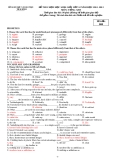
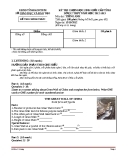
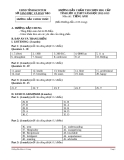
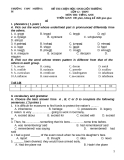
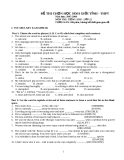
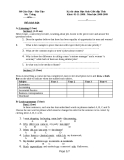
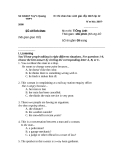





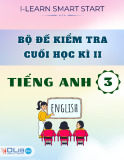





![Đề thi Tiếng Anh có đáp án [kèm lời giải chi tiết]](https://cdn.tailieu.vn/images/document/thumbnail/2025/20250810/duykpmg/135x160/64731754886819.jpg)
